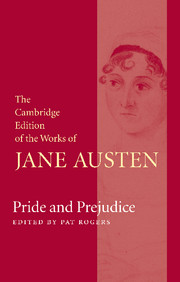Book contents
- Frontmatter
- Contents
- General Editor’s Preface
- Acknowledgements
- Chronology
- Introduction
- Note on the Text
- Pride and Prejudice
- Pride and Prejudice: Volume I
- Pride and Prejudice: Volume II
- Pride and Prejudice: Volume III
- Corrections and Emendations to 1813 text
- Appendix 1 Thomas Egerton and the Publication History
- Appendix 2 Legal and Military Background
- Appendix 3 Pemberley and its Models
- Appendix 4 Note on the second and third editions of Pride and Prejudice
- Abbreviations
- Explanatory Notes
Chapter 7
Published online by Cambridge University Press: 19 December 2020
- Frontmatter
- Contents
- General Editor’s Preface
- Acknowledgements
- Chronology
- Introduction
- Note on the Text
- Pride and Prejudice
- Pride and Prejudice: Volume I
- Pride and Prejudice: Volume II
- Pride and Prejudice: Volume III
- Corrections and Emendations to 1813 text
- Appendix 1 Thomas Egerton and the Publication History
- Appendix 2 Legal and Military Background
- Appendix 3 Pemberley and its Models
- Appendix 4 Note on the second and third editions of Pride and Prejudice
- Abbreviations
- Explanatory Notes
Summary
MR. BENNET's property consisted almost entirely in an estate of two thousand a year, which, unfortunately for his daughters, was entailed in default of heirs male, on a distant relation; and their mother's fortune, though ample for her situation in life, could but ill supply the deficiency of his. Her father had been an attorney in Meryton, and had left her four thousand pounds.
She had a sister married to a Mr. Phillips, who had been a clerk to their father, and succeeded him in the business, and a brother settled in London in a respectable line of trade.
The village of Longbourn was only one mile from Meryton; a most convenient distance for the young ladies, who were usually tempted thither three or four times a week, to pay their duty to their aunt and to a milliner's shop just over the way. The two youngest of the family, Catherine and Lydia, were particularly frequent in these attentions; their minds were more vacant than their sisters’, and when nothing better offered, a walk to Meryton was necessary to amuse their morning hours and furnish conversation for the evening; and however bare of news the country in general might be, they always contrived to learn some from their aunt. At present, indeed, they were well supplied both with news and happiness by the recent arrival of a militia regiment in the neighbourhood; it was to remain the whole winter, and Meryton was the head quarters.
Their visits to Mrs. Philips were now productive of the most interesting intelligence. Every day added something to their knowledge of the officers’ names and connections. Their lodgings were not long a secret, and at length they began to know the officers themselves. Mr. Philips visited them all, and this opened to his nieces a source of felicity unknown before. They could talk of nothing but officers; and Mr. Bingley’s large fortune, the mention of which gave animation to their mother, was worthless in their eyes when opposed to the regimentals of an ensign.
After listening one morning to their effusions on this subject, Mr. Bennet coolly observed,
- Type
- Chapter
- Information
- Pride and Prejudice , pp. 31 - 37Publisher: Cambridge University PressPrint publication year: 2006

